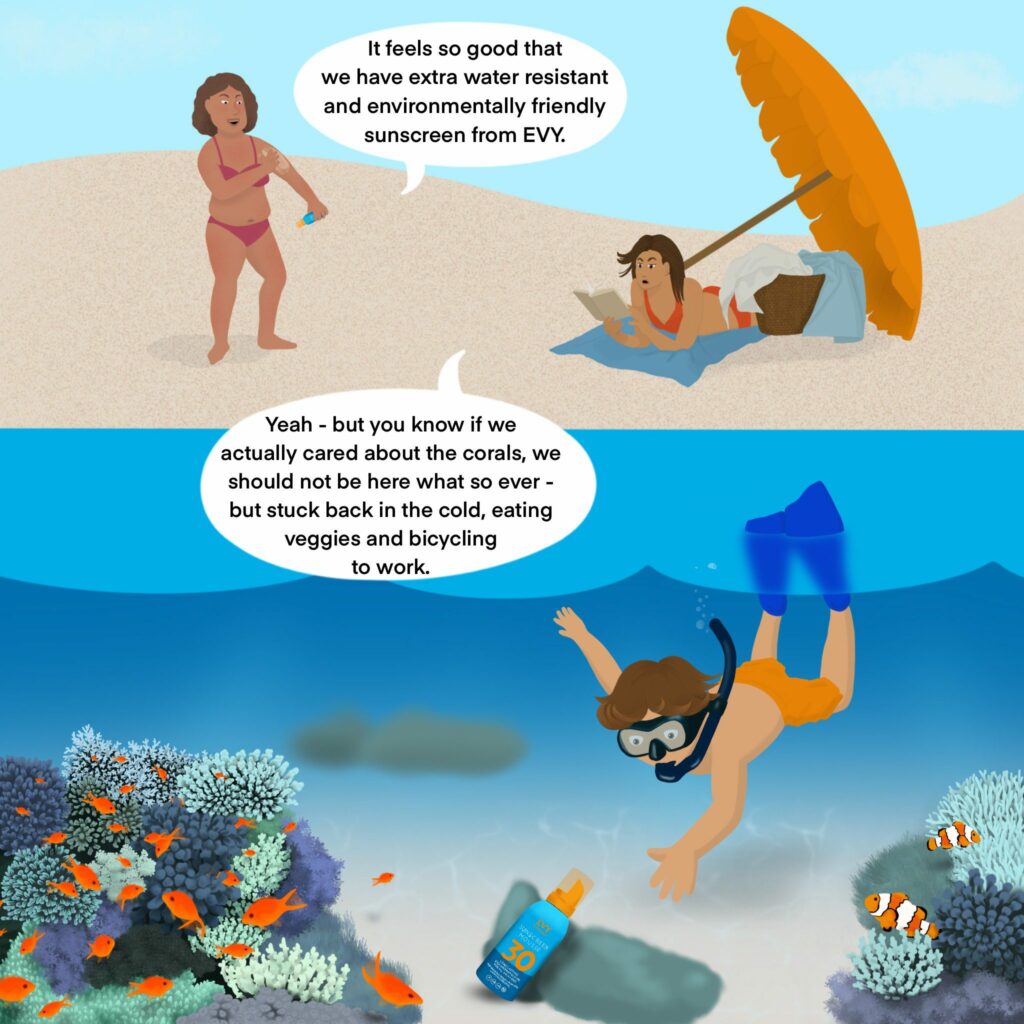For the past years, coral bleaching has been in the headlines due to the rapid decline of coral reefs. The devastating news raises questions on who to blame and what causes the severe bleaching.
Studies stating that UV-filters in sunscreens are a cause of coral bleaching have made a huge impact, resulting in brands labeling their products as “reef friendly” and politicians banning UV-filters. However, scientists who have dedicated their whole lives to researching coral bleaching criticize these studies as there’s no extensive research to back them up. They claim that politicians are not making educated decisions about UV-filters and certainly not putting focus on the real causes of coral bleaching. Consumers prefer easy solutions to problems, but in this case global warming are the real enemy of corals and marine life.
” We’re perplexed by the misguided distraction that a limited and unreplicated study about one of the sunscreen chemicals (oxybenzone) is gaining, and we’re frustrated that it’s taking the spotlight off scientifically proven concerns to reef decline. People are being led to believe there is extensive scientific evidence about the impact of oxybenzone on corals, and this is simply not true. ” (Florida today, 2021)
Carys Mitchelmore Professor in environmental science/aquatic toxicology and Doug Fenner, Coral reef monitoring ecologist.
Why are these studies questioned?
- They were performed in extreme conditions and in higher concentrations than what has ever been found in nature.
- They were performed in laboratories and did not mimic the way corals are exposed to sunscreen in real life.
- The most severe bleaching that has occurred are at remote places where there is almost no human activity.
- The concentrations of UV-filters found in nature are too low and too diluted to have an effect on corals.
If you follow the amazing Michelle from Labmuffinbeautyscience you might have encountered the saying “the dose makes the poison”. Meaning that everything can be toxic at a certain level but also safe at a certain level of concentration.
What are the real causes of coral bleaching?
The experts real concern in reef decline is climate change. Healthy corals live in symbiosis with the algea, zooxanthellae, which gives the coral its bright color. When the temperature increases, the symbiotic relationship is affected – the coral expels the algea. If the temperature doesn’t go down, the coral bleaches and eventually dies. Overfishing is also a huge problem as it affects the set-up of the ecosystem and the fish feeding on the algea. Then there’s water quality issues close to cities. Fertilizers and poor wastewater managements are big factors to reef decline.

The solution?
Rethink your lifestyle choices! Air travel has a greater impact on reef decline than using sunscreen. However, when you’re swimming in the sea it is important to not leave a footprint. Use an extra water-resistant sunscreen as it doesn’t come off as much in water and always apply 20 min before swimming. We believe it’s better to look at the concentration of the ingredients than the actual ingredients. The dosage and how a product is used is what is important. It’s also important to be aware of that, certifications often cost a lot of money for companies to use. Thus, a product marked “reef friendly” isn’t necessarily better for the environment than an uncertified product.
Nevertheless, the concentration limit varies in different parts of the world. In the US the limit is much higher than in Europe for instance. You can usually tell by the smell of the sunscreen, where higher concentrations smell more and are often masqued with perfumes. When it comes to EVY, we have a unique set-up of UV-filters and because of our patented formula we can keep the concentrations very low. EVYs blue bottles are extra water resistant and don’t wash off while swimming in the sea.
Please visit WWF to read more about what you can do to prevent coral bleaching. Professor Terry Hughes is an expert in coral reef decline and is very active in how to save these unique underwater worlds. Read more about his work here or follow him on twitter.
Sources
- https://theconversation.com/theres-insufficient-evidence-your-sunscreen-harms-coral-reefs-109567
- https://www.abc.net.au/news/2018-05-04/hawaii-bans-sunscreen-coral-bleaching/9728322
- https://eu.floridatoday.com/story/opinion/2019/07/01/data-doesnt-back-sunscreen-bans-protect-coral-reefs/1620711001/
- Carbon brief Terry Hughes
- Labmuffin – Is your sunscreen killing coral
- Labmuffin _ More SPF mythbusting
- James Cook University
- WWF
